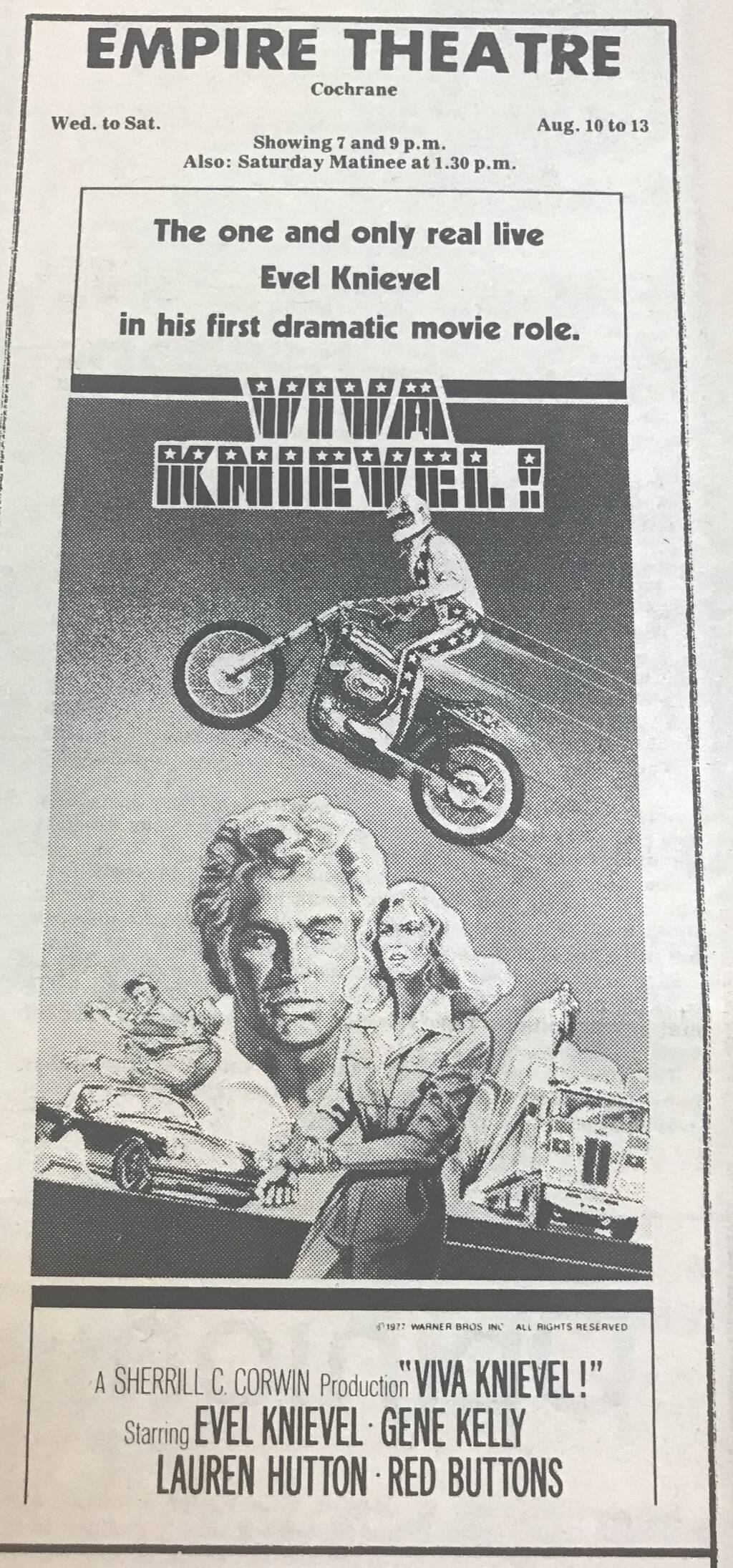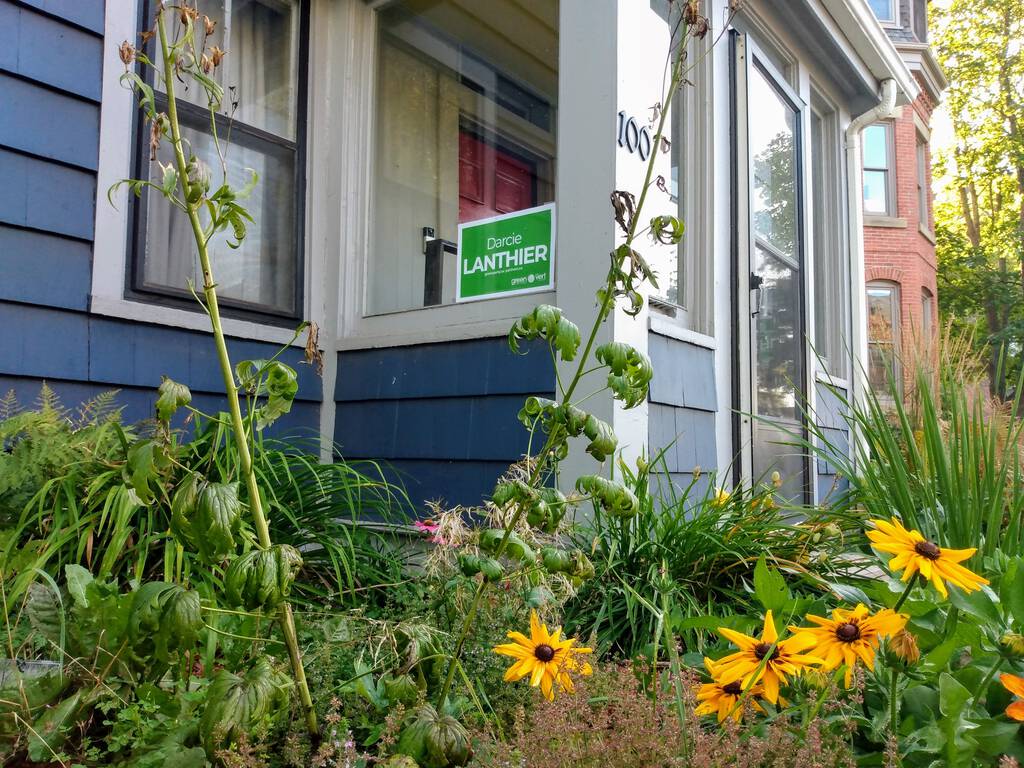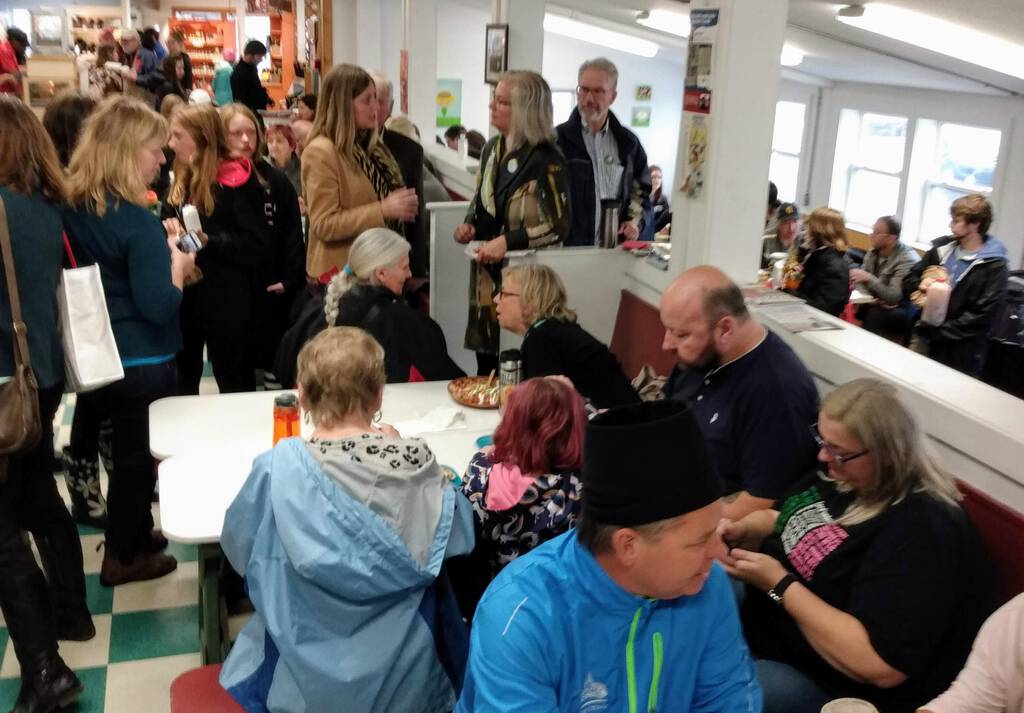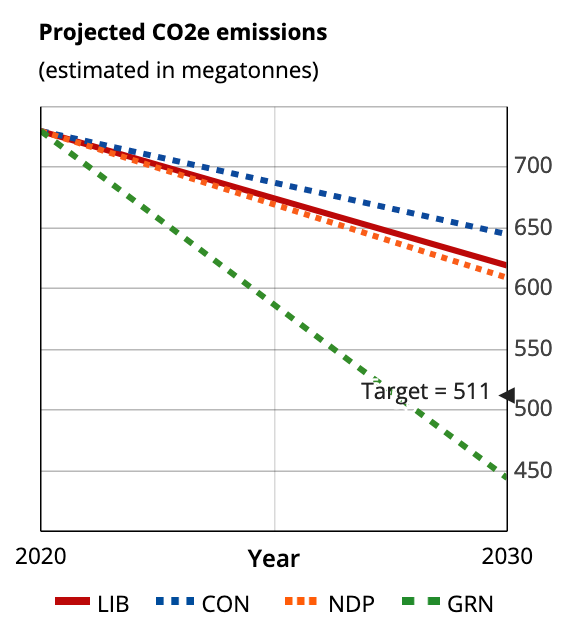I heard a passing reference to the late motorcycle stunt impresario Evel Knievel last week that brought back a lot of memories. In a way that would perhaps boggle the mind of younger people, Knievel was a significant pop culture presence in my youth; it seemed that he was forever on the brink of some motorcycle-jumping grand feat or another.
For reasons I cannot explain, I have a very strong memory of seeing the 1977 film Viva Knievel! in the Empire Theatre in Cochrane, Ontario shortly after it was released.
With the help of my brothers and my parents I was able to narrow down the timing of our 1977 visit to Cochrane, to my maternal grandparents, to the middle of August, and then, with the help of the excellent Cochrane Public Library, I was able to request a scan of the movie listings from The Northland Post for that week. And, sure enough:

I am fascinated by films like this that bridge the generations: Viva Knievel! starred not only the eponymous Knievel, but also Gene Kelly, Laurent Hutton and Red Buttons, actors who seem like they should exist in a different time stream than Evel Knievel but clearly don’t (see also Ethel Merman on The Love Boat, playing the role of Gopher’s mother and singing a song from A Chorus Line).
That 1977 trip to Cochrane saw us continue on from Cochrane to Winnipeg; I was 11 years old, and it was perhaps the most of epic of the family camping trips we took when I was a kid. Perhaps that’s why I remember Viva Knievel! so strongly.
This is Oliver’s testimonial for Darcie Lanthier, Green candidate for Charlottetown, running on her Facebook page. And he’s right on all points.
(The photo was taken on the day Oliver joined both the provincial and federal Green parties in February; he picked a good day to do it).

An essay in Belt Magazine by Harmony Cox begins:
In the months before I came out of the closet and asked my husband for a separation, I did a lot of things. I googled terms like “later-in-life lesbian” and “irreconcilable differences.” I quietly began the work of separating our finances. I slept in my bed—my newly-purchased separate bed, where I’d been sleeping while we tried to work things out—felt the cold space next to me, and cried.
But mostly, I drove.
What with the maelstrom that our family has found itself in for the past month, I’ve been hard-pressed to find any time to help out on Darcie Lanthier’s Green campaign here in Charlottetown. But things have calmed down now enough so that when campaign HQ phoned last week looking for volunteers, I was able to sign myself and Oliver up for a stint of data entry this afternoon.
But then Oliver caught a cold, and is in no shape for getting off the couch, let alone doing data entry, so I bus-cycled by myself up to Darcie’s campaign office, on Brackley Point Road near Ellis Bros., just after lunch and offered up my services.
I’ve done a lot of election-related data entry over the years, but of the non-partisan sort. And even then, I was, more often than not, the supervisor of the systems upon which armies of people more talented than I were doing the data entry. So this was my time to experience full-on partisan data entry, and to use someone else’s system to do it with.
The Greens, it turns out, are a technologically-advanced lot, and the system was a lovely vehicle for doing what needed to be done. So much so that my fellow data-enterer and I finished our task quickly, and were looking for something else to do.
“How would you feel about helping out with the telephone canvas?”, I was asked by the friendly campaign team member guiding my way.
Panic set in. Call people!? Strangers?! Me? There’s no way in hell I can do that.
“Sure, I’d be happy to do that,” I squeaked out.
People further down the campaign volunteering rabbit hole than I have told me that the first call you make, or the first door you knock on, is the hardest one. And that was certainly true in my case. I dialed the first number with some trepidation, not knowing what would be on the other end.
To my surprise, I wasn’t yelled at. Indeed it was a rather pleasant call.
So I made another one. And another one.
And after about 15 minutes I was cooking with gas, and actually enjoying myself.
I kept on going until the call-queue ran dry, and packed up and cycled home around 5:00 p.m., feeling energized; on my way out the door I offered to do more over the course of this week, something 1:00 p.m. me would never have imagined 5:00 p.m. me doing.

Flour from Crystal Green Farms, milk from Purity Dairy, butter from ADL, eggs from Paul Offer. Only the baking powder and the salt came from away.

When Green Party leader Elizabeth May said, to Conservative leader Andrew Scheer, in last week’s English language leaders’ debate, “With two weeks left in this election campaign, Canadians can know one thing. At this point, Mr. Scheer, with all due respect, you’re not going to be Prime Minister. The question is going to be on a seat count —” it was possible to take this simply as false bravado.
But, as journalist Steve Paikin reminds us in Why winning the most seats doesn’t always mean winning the election, becoming Prime Minister isn’t (only) about seat count, it’s about obtaining the confidence of the house to govern, and in this practice the opening move goes to the current Prime Minister.
This means that even in the case where the Conservatives win more districts than any other party, they won’t automatically–and indeed, are unlikely to–form government, as Liberal leader Justin Trudeau will have an opportunity to negotiate a coalition with the other parties, a negotiation that would have a good chance of success. Paikin relates the aftermath of the 1925 federal election to illustrate his point:
So whoever can command the confidence of Parliament wins the right to govern, even if they haven’t won the largest number of seats. Perhaps the best example of this happened in 1925, when Prime Minister William Lyon Mackenzie King’s government went down to apparent defeat at the hands of the Conservatives. King returned with only 100 Liberal MPs; the first-place Tories had 115. But the third-place Progressives won 22 seats and opted to back King, who concluded that he could continue to govern with their support.
At this hour the CBC Poll Tracker is showing the Conservatives with an 8% probability of winning a majority of seats; the remaining 92% of probabilities are situations where there is a solid possibility that the government will be a Liberal-led coalition or majority.
A friend who told me yesterday, by way of explaining his plan to vote “strategically” for the Liberal candidate in Charlottetown, “as I see it the only clear thing to do is to vote Liberal, to stop Scheer.”
Earlier this week Peter Bevan-Baker, provincial Green leader, made the case for voting your values to get the kind of government you want:
Strategic voting sucks. Voting for candidates & parties you don’t particularly like or want gives us governments we don’t particularly like or want. Voting for a person or party you trust and are inspired by might finally give us a government we trust and are inspired by.
If you are not swayed by this approach, and are determined to vote not by looking inside yourself but rather by trying to game out a situation to prevent what you see as the worst-worst, please take a moment to consider the nature of the minority government we’re likely going to see formed after this election, and consider who you want representing your district in that coalition.
I voted for Ralph Nader in 2000, so I know a little bit about (not) voting strategically. And, indeed, the mathematics of that US election are, I think, where the modern strategic voting era began, and the Bush presidency that resulted from that election cast an understandably long shadow that has intruded into our Canadian elections.
But we elect a parliament in Canada, not a Prime Minister, and your vote for your local candidate, especially in this election, is not about Trudeau or Scheer, it’s about who you think capable of truly collaborating in what promises to be the most important coalition ever formed in Canada.
Oliver’s got the death of a cold, so I made my way to the Charlottetown Farmers’ Market by myself this morning.
After a healthy amount of Duckduckgoing “how to cycle in the rain,” I decided I was not up for it, so I took the bus instead. It was a soggy walk from Subway to the market, but the passing cars were kind, and slowed down to prevent causing monsoons from driving headlong through the standing water.
In addition to being Thanksgiving-busy, the market was also Elizabeth May-busy this morning, as she made a quick campaign stop en (Tesla) route from Pownal to Cape Breton that included a lunch of Claudia’s Mexican food. And a lot of chatting with a lot of people.
It’s quite humbling to see May in action: her entourage is lean, and she is open. To everyone who approaches. It must be exhausting, and we all owe her a great debt for her tenacity.
I escaped from the melee on to the loading dock of the market for some quiet reflection, and recorded 30 seconds of the suddenly-torrential rain falling on the metal roof.
My friend Ann rescued me from a wet walk back to the bus stop by offering me a ride home; it was on her way.
Where I delivered a smoked salmon bagel and cup of tea to ailing Oliver. Who will, I think, spend most of the day sleeping.

My friend Bree pointed me to the work of scholar Shahzeen Attari whose research, says her bio, “focuses on people’s judgments and decisions about resource use and systems, and how to motivate action on climate change.”
Her most recent paper, with Gregg Sparkman, in Energy Research & Social Science, is Credibility, communication, and climate change: How lifestyle inconsistency and do-gooder derogation impact decarbonization advocacy and it is a fascinating read on a subject that I’ve been thinking a lot about. The heart of it comes in this sentence at the end of the abstract (emphasis mine):
Overall, these results suggest that advocates, especially experts, are most credible and influential when they adopt many sustainable behaviors in their day-to-day lives, so long as they are not seen as too extreme.
In other words, it’s fine to model sustainable behaviour, just don’t be an asshole about it.
I think about my writing about my cycle to and from Charlottetown Airport last month in this light.
While I undertook the trip as a personal challenge, I wrote about the trip as a way of, I’d hoped, showing others what’s possible, and encouraging them to examine their own climate footprint from transportation. But what if this had the opposite effect from what I intended? What if it was such an outlandish and practically useless idea that the most common reaction was along the lines of “well, that’s all very well and good, but…” rather than “I could try that”?
In the words of the paper:
Why would seeing advocates practice what they preach backfire? People are frequently drawn to making comparisons to others in order to evaluate oneself. When people evaluate others who perform better than oneself, particularly in moral domains, they may feel negatively about themselves. However, people are highly motivated to maintain a positive view of themselves as moral, competent and contributing members of society and may seek to derogate others, including the do-gooder, to decrease the negative feelings that may arise about themselves. Research finds that people take aim at do-gooders in a range of domains, from eating a vegetarian diet to speaking up against prejudice. Advocates’ efforts may also be harmed by being do-gooders: research has found that when physicians “practice what they preach” and live in a very healthy manner, for instance, their patients may anticipate being negatively judged, and avoid their physician. Thus, advocates who are do-gooders can also be understood as naturally soliciting a form of psychological reactance—a desire to disobey or resist influence from others: marginalizing the do-gooder and their cause offers people a tempting way to maintain a positive self-view and freedom to choose their own actions
While addressing the climate crisis is an effort fought on many fronts, so much of what it takes on a personal level is changing our habits. And that’s a really, really difficult thing to do, even when we’re motivated. And especially when we’re trying to convince others to do likewise. As such, the skills we need to cultivate are as much in the realm of psychology and sociology as they are in infrastructure and economics.
This is not to suggest that modeling sustainable behaviour isn’t helpful, as the paper makes clear in its conclusion:
We find that advocates for decarbonization are more influential when they take action to reduce their personal carbon footprint, including having an energy efficient home, using renewable energy, reducing their meat consumption, and how often they fly. This is especially true of advocates who are experts and less so for non-expert peers. Notably, this does not mean that experts must radically transform every aspect of their lives overnight to be effective. In fact, our work suggests that the advocates with the most exemplary lifestyles do not necessarily fair better (and may even be less effective) than those who take some action. Therefore, it may be helpful for experts to highlight to some substantial pro-environmental behaviors that they do. Overall, our findings suggest using an approach that combines advocacy efforts of experts who carefully consider their own sustainability choices, and non-experts, even those who still have a lot of room for improvement, may serve as effective communicators to help society reach its decarbonization goals.
That’s helpful advice.
The CBC had Navius Research analyze the platforms of the four major federal political parties in this month’s election “to project the impact of each party’s climate policies.”
Here’s the chart that says it all:

Only the Green Party has a plan to reduce CO2e emissions to a level will surpass Canada’s (already unambitious) target of 30 per cent below 2005 levels by 2030.
While GDP is a blunt instrument for measuring population health, those that would fear an economic collapse from the Green plan can be reassured by the study’s conclusion about the Green plan’s impact on the economy:
“When I look at that GDP data I’m actually pretty reassured,” said Carter. “I mean even the Greens have what we’ve been calling the most radical policy here. They are not bringing us into recession. This is not a recessionary picture at all.”
(If you want to talk to Green Party leader Elizabeth May about the Green plan, she’ll be at the Charlottetown Farmer’s Market tomorrow morning).
Oliver and I cycled out to the Zero Waste Night Market tonight at Riverview Country Market. There was a good crowd of people in attendance, including a healthy cross-section of the Green caucus, sampling the wares of vendors gathered in the parking lot. There was soap and cider and chocolate and coffee and tomatoes and all manner of bulk shampoo.
The evening wasn’t religiously zero-waste; less-waste or sorry-for-the-waste were predominant. But it certainly scored better than a night at Sobeys. Especially because we came equipped with reusable containers.
It’s pretty easy to get to Riverview from downtown by bicycle, with the multiuse trail along Riverside Drive; the route could use some improving, though, both in trail upkeep and in the confusing need to navigate Park Street to get to and from Confederation Trail. We talked about this at this week’s meeting of the Mayor’s Task Force on Active Transportation, and I’m hopeful improvements will come, especially when the Provincial Government Garage closes.

 I am
I am